Do you think having multiple web pages for the same keyword or intent makes all three web pages appear in SERP? Can it increase the number of organic traffic to your website?
Well, Google does reverse engineering on this case! What? Yes, you heard right!
You make your own web pages to battle to compete with what is best among them.
Google stumbles upon choosing the right page for the keyword, and it hurts the performance of all the web pages with the same intent or keyword.
In this article, you will learn through the concept of keyword cannibalization—the way to find them and fix this content quality issue.
What is Keyword Cannibalization?
Keyword cannibalization is a Google content quality issue when two or more web pages of the same website use the same keyword or intent to compete with each other.
As a result, Google makes sure no pages with the same intent get organic visibility in SERP (Search engine results page).
The word cannibalization is referred to as “killing the sales of a product by another product of the same company” in terms of business.
Similarly, people cannibalize the CTR, organic traffic, and other SEO benefits by creating two or more pages of the same intent.
For example,
let’s assume the website ABC builds a web page and optimize the page with the keyword “Digital Marketing Agency.”
The web page ranks on the 1st page of Google and attracts 1000+ organic visitors every month.
After 3 months, the website owner thinks of building another page of the same intent, so rank them on the 1st page to get more than 500+ organic traffic.
This time, optimize the web page with the keyword “Cheap digital marketing company.”
Even though the key phrases are different, the intent is the same.
So, once the page gets indexed in Google databases, Google pulls out the existing page that gave 1000+ organic traffic out of the ranking.
Keyword cannibalization is an act of self-killing.
Why Keyword Cannibalization Is Bad for SEO?
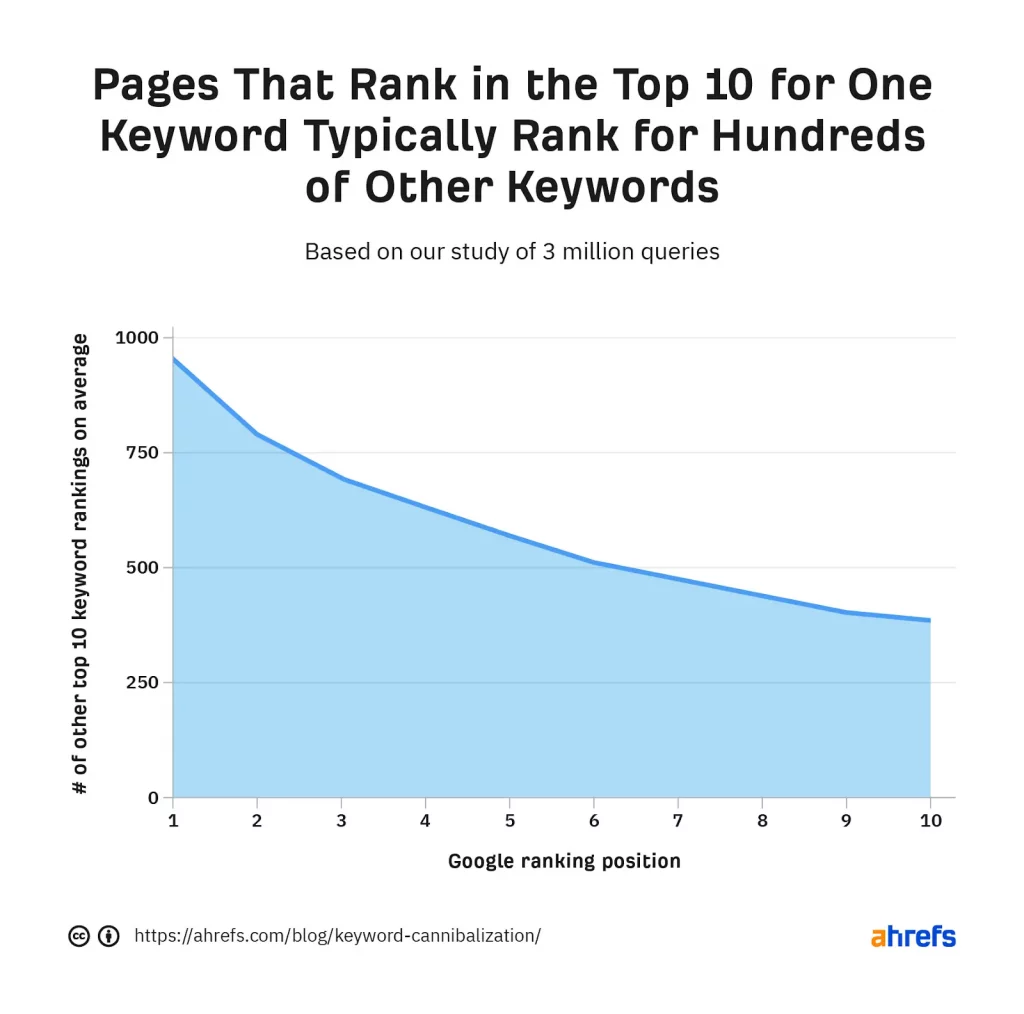
Besides key phrases, Google looks at the intent behind the web page. If a web page ranks 100 keywords, there will be the formation of cannibalization if a web page is created with any ranked keywords as core intent.
When two web pages of the website battle for the same keywords or intent, it dilutes the CTR and ranking opportunities.
This makes your SEO process effortless by delisting all the web pages from ranking. Better is to do a regular content audit with respective keywords that are ranking.
Keyword cannibalization will be a primary factor if you see any keyword vanishes out of 100 positions in SERP.
Identifying Keyword Cannibalization:
There are multiple way to identify if a keyword is demote due to keyword cannibalization issue.
1. Run a Site: yourdomain in Google Search:
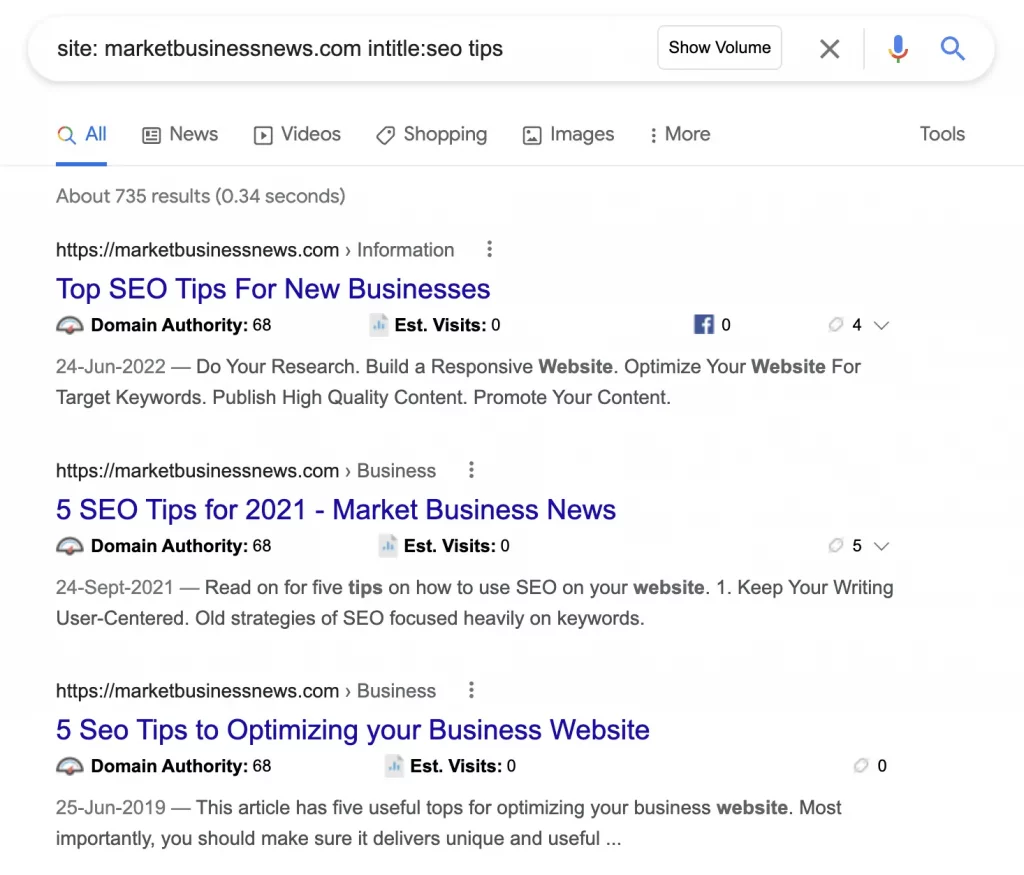
This is one of the prime technique used to identify that are cannibalized, and it doesn’t require any professional tools.
When you place site:https://yourdomain.com/ intitle: keyword, you will get all the relevant web pages of the website in SERP.
In this case, we have taken the site URL of marketbusinessnews and keyword as SEO tip.
So, you can see the above image with 3 different web pages ranking for the same intent “SEO tips.”
Obviously, all these three web pages don’t get any organic traffic.
Professional SEO Tools:
Google Search Console:
Google Search Console is a free SEO tool that is a Gold mine when used with proper knowledge. This tool helps in identifying the web pages with cannibalization for a keyword.
Google Search Console tracks user performance on a website like clicks, impressions, CTR, and Average rank. They map these 4 attributes with a query, web pages, country, devices, appearance, etc.
To identify the keyword cannibalization for specific queries with the help of the Google search console, follow the proceeding steps.
Step 1: Log in to Google Search Console and select the property for which you need validation.
Step 2:
- Click on the search results.
- Set the date to last 28 days (usually we recommend).
- Press the New (+) button.
You will get a dashboard, as below image with five options popping down from the New tab. They are Query, Page, Country, Device, and Search Appearance.
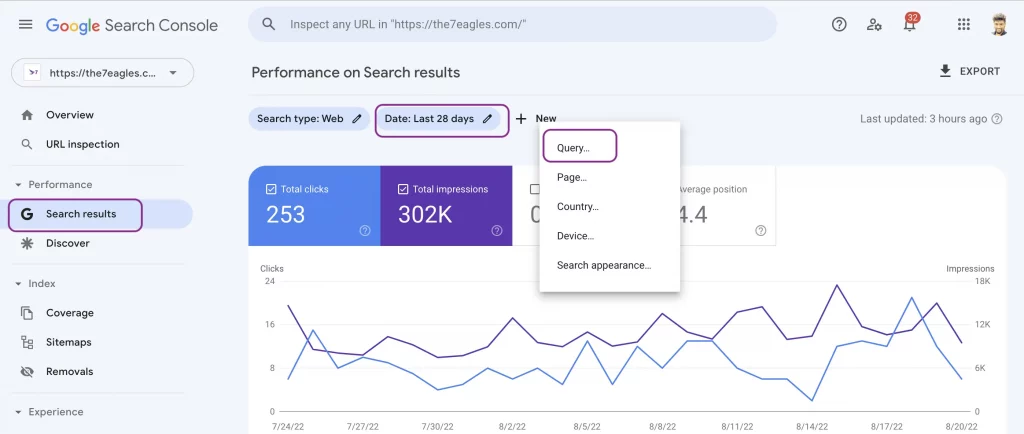
Step 3: Select Query, and enter the keyword you are looking for to validate cannibalization. Don’t forget to select the exact query option.
Step 4: Once the query is selected, scroll down and select the Pages.
Here you will find the details of all web pages cannibalized for the query.
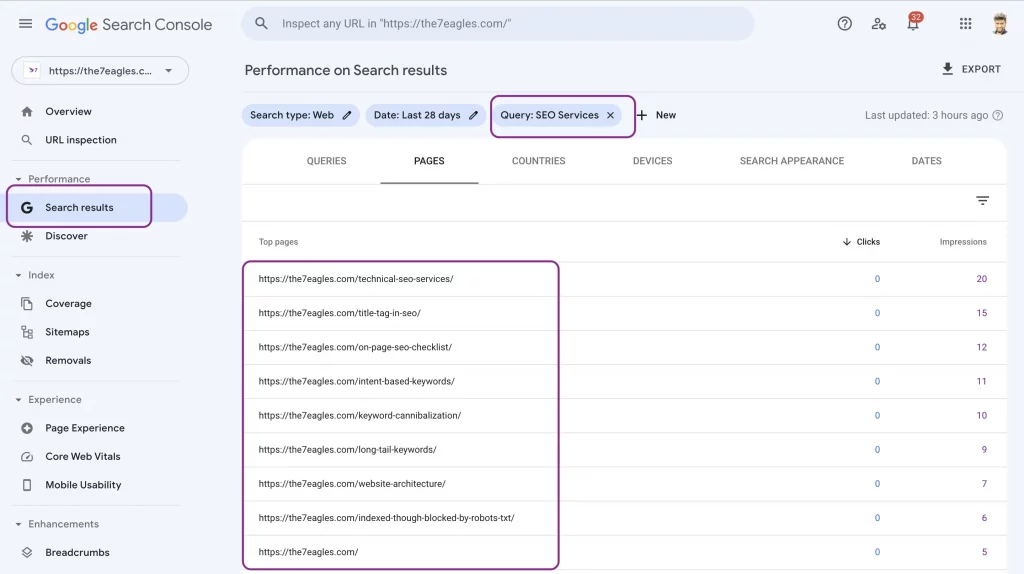
SEMrush:
SEMrush is one of our team’s SEO audit tools in daily practice. This tool provides the details of keyword cannibalization.
For this, you should have purchased the tool in the Guru plan, as it provides the complete detail of keyword cannibalization.
Once you have a paid version, you should activate keyword tracking “on” and add all the keywords you wish to track.
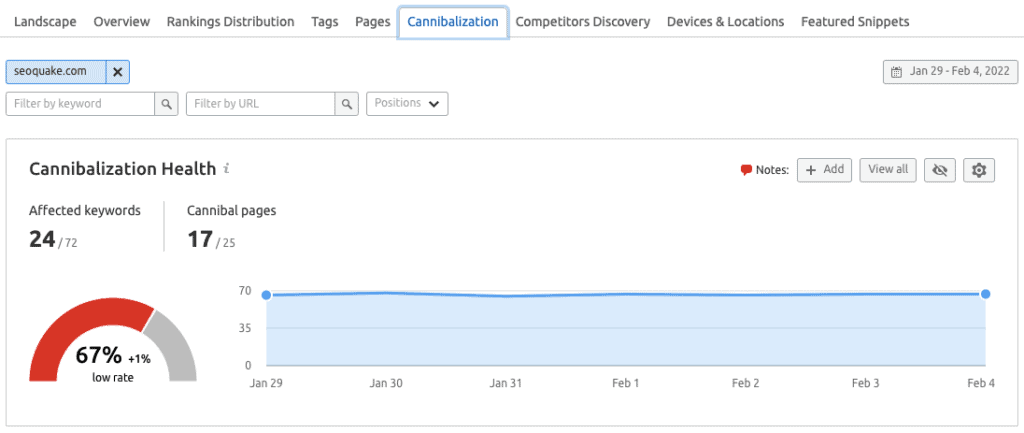
In the position tracking dashboard, you have an option to check the cannibalization status only for the tracked keywords.
It shows the number of web pages cannibalized, and you can get the history of the web pages that have ranked for a single keyword, as seen in the image below.
Note: To check the keyword cannibalization for any keyword using SEMrush, you should add them to position tracking.

Ahrefs:
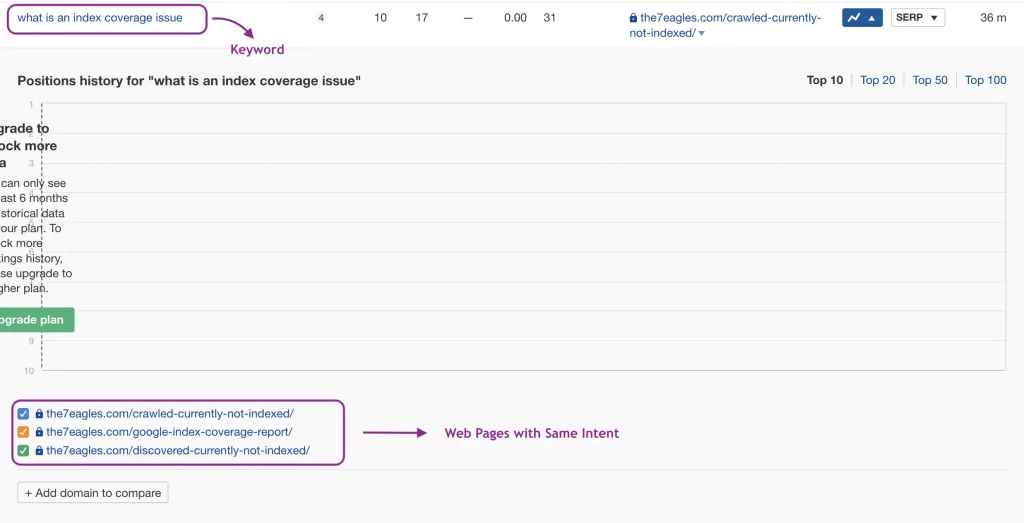
Ahrefs is another SEO tool with vast parameters that could help every SEO professional simplify the process.
This tool helps us to identify what all web pages battle for the same keyword. For this, you should track the keywords. Of course, the Organic keywords tab from the tool provides these details.
Once you have identified the errors, fix them immediately, as it will spoil the organic opportunities of all the associated web pages in the report.
Note: To check the keyword cannibalization for any keyword using Ahrefs, you should add them to the Rank tracker
There are many other tools and methods to identify keyword cannibalization. Yet, we practice using the above techniques, and tools that provide accurate results.
How to Fix Keyword Cannibalization Issues?
Use SERP Analysis to Avoid Keyword Cannibalization
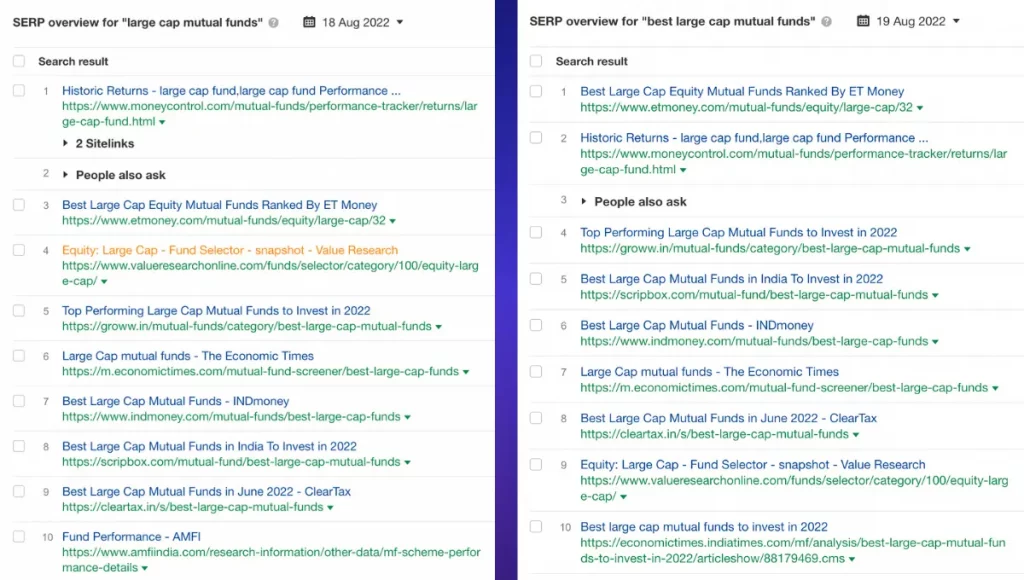
This method does not fix the error, but it helps to avoid the cannibalization of multiple pages for a keyword.
You can use the Search engine results page (SERP) to find out the intent behind every keyword. Also, you can compare two keywords to understand the conflict in intent.
In the above image, we have differentiated two keywords SERP features. One is “large cap mutual funds,” and the other is “best large cap mutual funds.“
It is easy to understand the intent behind these two keywords. One is informational, and the other is transactional.
But, search engines see these keywords have similar intent and rank 8 out 0f 10 web pages identical for both.
So, creating two web pages for these two keywords will result in keyword cannibalization.
Similarly, you can check for any keyword to understand the intent behind a keyword by the search engine.
Merge Multiples Web Pages with Same Intent into Single Web Page:
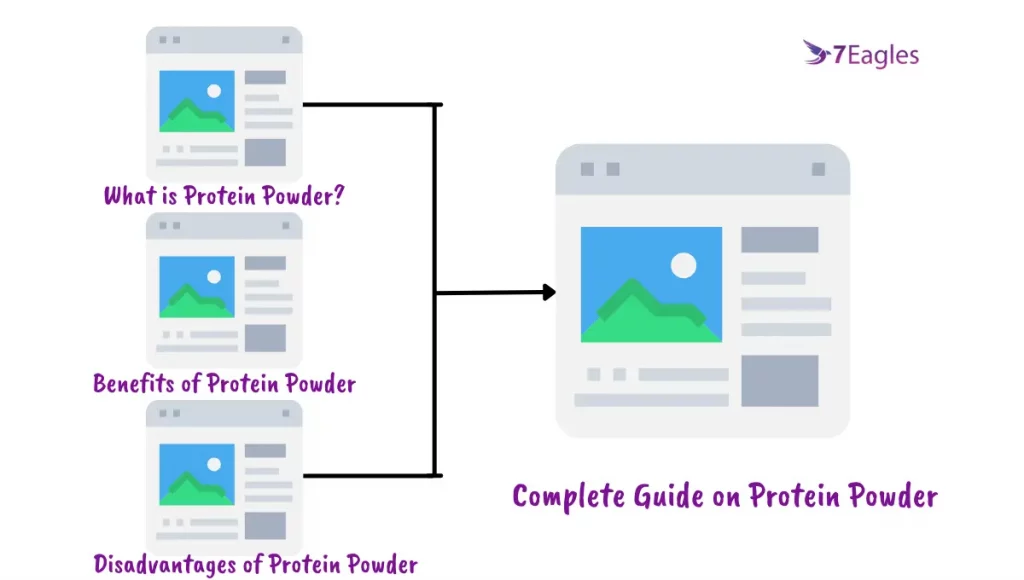
When you find keyword cannibalization between multiple pages for the same intent, the best solution is to fix the issue.
Let us assume that you target three focus web pages:
- What is Protein Powder?
- Benefits of Protein Powder
- Disadvantages of Protein powder
The pillar page is “What is protein powder” with the focus keyword “protein powder.”
But, while tracking the same keyword, you find a fluctuation in ranking. So you use Google Search Console, Ahrefs, or SEMrush to check the cannibalization for the keyword “protein powder.“
If you find more pages ranked in SERP for the same keywords, like benefits of protein powder and disadvantage of protein powder.
You can merge these three web pages into the same web page as “Complete Guide on Protein Powder.“
Once the merge is done, delete the unwanted web pages, and use the removal tool from the Google Search Console to remove the web pages from the Google index or tag them under the 410 response code.
301 Redirect:
Once you have merged multiple web pages of same intent or keyword, the next step is to redirect the deleted web page to the merged page.
This helps in transferring the link equity, authority of existing web page to the new web page.
We generally don’t advise using too many 301 redirects; however, redirects are the solution to point towards merged web pages when multiple pages rank for the same keywords.
By linking less relevant pages to a more authoritative version, 301 lets you consolidate your content that has been cannibalized.
A similar content page or a page matching a specific keyword query will benefit most from this tactic.
Conclusion:
- Keyword cannibalization is an issue that is caused when two or more web pages have the same keyword or intent.
- Keyword cannibalization can hurt your SEO performance by removing all the cannibalized web pages from ranking.
- You have to avoid creating web pages with similar intent. For this, use SERP to understand the intent of any keyword with the search engine.
- You can find the web pages that are affected by keyword cannibalization with the help of professional SEO tools like Google Search Console, SEMrush, and Ahrefs.
- Fix this issue by merging the web pages of the same intent into a single web page. Try redirecting 301 for the removed web page to the merged web page.
- If you still find fixing keyword cannibalization a tedious process, book SEO Services with our team.













